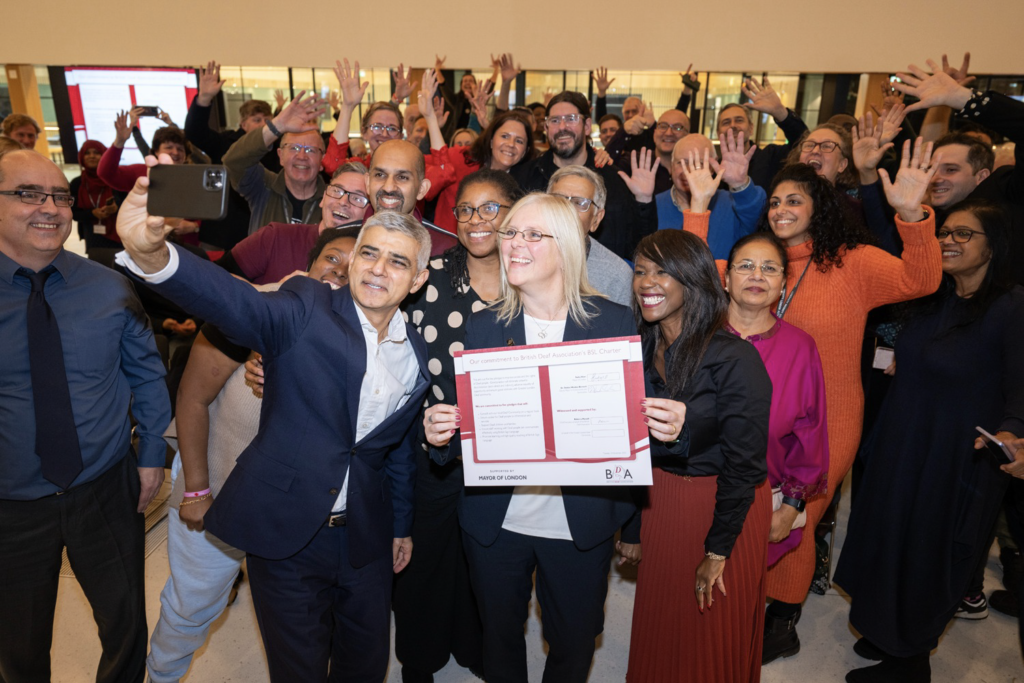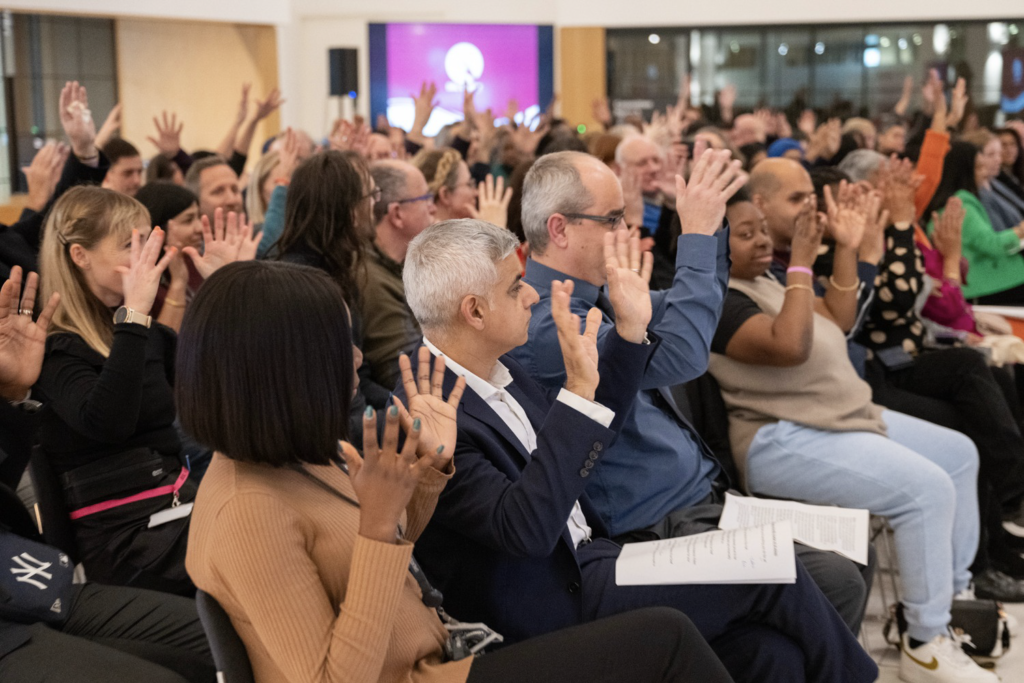The Mayor of London, Sadiq Khan, has today encouraged organisations across the capital to help tackle inequalities as he signed the British Deaf Association’s British Sign Language Charter for British Sign Language.
- Mayor signs the British Deaf Association’s Charter for British Sign Language to help eliminate barriers faced by London’s Deaf communities
- The Charter sets out five key pledges to address discrimination, empower Deaf communities and build stronger relationships between City Hall and Deaf Londoners
- By signing the Charter, City Hall is committing to improve access for Deaf Londoners
Sadiq and Deputy Mayor for Communities and Social Justice, Dr Debbie Weekes-Bernard, welcomed members of London’s Deaf communities and representatives from organisations and services that work with, or advocate for, Deaf Londoners to City Hall today to witness the signing of the Charter for British Sign Language.
The Charter, designed by the British Deaf Association, aims to promote better access to public services for Deaf Londoners, address discrimination and empower Deaf communities. BSL is the first language for many Londoners, and by implementing the Charter, the Mayor and City Hall are committing to meet the needs of Deaf Londoners, uphold their rights and ensure access to City Hall’s information and services.

By signing the Charter, an organisation commits to a tailored set of actions aimed at improving accessibility and inclusion of Deaf people. The Charter is structured around five pledges, these are:
- consulting with local Deaf people on a regular basis.
- ensuring Deaf Londoners have access to information and services.
- supporting Deaf children and their families.
- ensuring City Hall staff working with Deaf people can communicate effectively using BSL.
- promoting learning and high-quality teaching of BSL.
The Mayor of London, Sadiq Khan, said: “Deaf Londoners have a right to participate fully in society without having to face barriers and obstacles. Signing the Charter for British Sign Language is a significant step forward for our city. I want to encourage all employers in the capital to follow our lead and ensure that Deaf Londoners are empowered to reach their potential as we continue building a fairer London for everyone.”
Deputy Mayor for Communities and Social Justice, Dr Debbie Weekes-Bernard, said: “It is vitally important that we support Deaf Londoners by addressing the inequalities that many face. City Hall’s commitment to the BDA’s Charter for British Sign Language means that more Deaf Londoners will be able to access information about vital services, while also ensuring they can communicate effectively with City Hall staff. I am delighted that we are taking this important step and helping City Hall become an even more accessible, inclusive and progressive organisation.”

Chief Executive Officer of the British Deaf Association, Rebecca Mansell, said: “The British Deaf Association (BDA) are incredibly proud of City Hall’s adoption of the Charter for British Sign Language (BSL). The signing of the Charter shows the Mayor’s commitment to improving access and rights for Deaf Londoners who use sign language.
“Last year, UK Parliament recognised British Sign Language as a language of Great Britain, passing into law as the BSL Act 2022. It was an historic day for the Deaf community in the UK. British Sign Language is Britain’s fourth indigenous language, after English, Welsh, and Scottish Gaelic. It is only right that BSL be accorded the same status and legal protection.
“We believe the key to the success of the Act will be the full inclusion and input of Deaf BSL signers from the start of all decision making, policy development, funding and support mechanism processes.
“City Hall is setting an example of how this can be achieved through the adoption of the Charter for British Sign Language. As the only national representative organisation of BSL in the UK, we are looking forward to supporting your BSL journey.”
The move comes as the Mayor takes further strides to ensure City Hall is a truly inclusive employer, leading the way and inspiring other organisations to proactively tackle structural inequalities and place accessibility at the heart of policy.
In 2021, City Hall was one of the first employers to publish disability pay gap data, alongside an action plan to address the disparity. The Mayor encourages other organisations to do the same through the Good Work Standard.
All Mayoral events in Trafalgar Square, including St Patrick’s Day, Black On The Square, Eid, Pride and Diwali, have BSL interpretation. BSL interpreters at People’s Question Time and the State of London Debate ensure Deaf people can participate in discussions about issues affecting them as Londoners.
Other measures include working with Deaf and Disabled people’s Organisations (DDPOs) to ensure that City Hallinvolves disabled Londoners and considers their needs in all its work, and through the Adult Education Budget, providing funding for anyone who is Deaf to take a course in BSL up to level 2. This opportunity has recently been extended to anyone who is on a low income or unemployed.
Chaired by the Deputy Mayor for Communities and Social Justice, City Hall’s DDPO Forum brings together organisations to provide advocacy and advice on inclusive practices and issues faced by Deaf and disabled Londoners. The views and experiences shared during the forum are used to inform City Hall’s policies and initiatives.
The Mayor has also opened up funding for higher level qualifications in BSL, including interpreting skills to support the professional growth of educators and interpreters.



